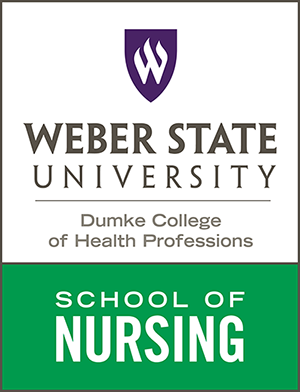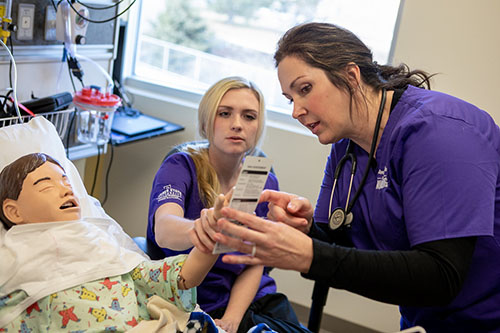Board of Regents Approves Doctor of Nursing Practice at Weber State
OGDEN, Utah – The Utah State Board of Regents approved the first doctoral program at Weber State University, a Doctor of Nursing Practice (DNP), which will be offered in two emphasis areas: Family Nurse Practitioner (FNP) and Leadership.
Contingent on receiving approval from the Northwest Commission on Colleges and Universities, the DNP expects to begin admitting 35 students fall 2019.
 “This is an amazing time for Weber State’s Annie Taylor Dee School of Nursing,” said Susan Thornock, chair. “The Doctor of Nursing Practice degree is the culmination of years of hard work and dedication by past and present faculty and staff. Weber State has always believed in, and promoted the stackable-credentials model to enhance the workforce and provide the best educational choices. This degree is just another example of how WSU serves our community.”
“This is an amazing time for Weber State’s Annie Taylor Dee School of Nursing,” said Susan Thornock, chair. “The Doctor of Nursing Practice degree is the culmination of years of hard work and dedication by past and present faculty and staff. Weber State has always believed in, and promoted the stackable-credentials model to enhance the workforce and provide the best educational choices. This degree is just another example of how WSU serves our community.”
With this degree, Weber State will now provide education for every level of nurse, from the practical nurse to the registered nurse all the way to the doctoral-prepared nurse.
Currently, two institutions in Utah provide accredited DNP programs: University of Utah, which provides a number of specialty DNP programs, and Rocky Mountain University of Health Professions. Data shows that Rocky Mountain issued 32 DNP degrees from 2015 to 2017; the University of Utah issued 213 DNP degrees over the same period. Weber State University anticipates 20 annual program graduates in the family practice emphasis and 15 graduates in the leadership emphasis in each of years three, four and five following program implementation.
Students at Weber State will earn a clinical doctorate degree, not a research doctorate, which is consistent with a regional university’s role to serve workforce needs.
According to the Utah Department of Workforce Services, the median income for a nurse practitioner is $98,260, and job openings average 110 per year.
The DNP-Leadership program prepares nurse leaders within the interdisciplinary health care systems level, working to improve quality of care, patient safety and patient outcomes.
“We are honored and excited to be able to provide a DNP degree to help elevate care and collaboration with other health care professionals in our community,” said Julie Gee, Master of Science in Nursing director. “The results of this degree program will greatly benefit and influence the health care outcomes for our community.”
On April 20, 2018, the National Organization of Nurse Practitioner Faculties (NONPF) “made the commitment to move all entry-level nurse practitioner (NP) education to the DNP degree by 2025.” This commitment was made in response to NONPF and other professional nursing organizations that have advocated raising the standards required for entry into the nurse practitioner profession.
Weber State's MSN program currently has three emphases from which students can choose: nurse educator, nurse executive and nurse practitioner (MSN-NP). The nurse educator and nurse executive MSN programs will have the option of a post MSN to DNP degree.
 The DNP-FNP program prepares clinical nurse leaders to meet the changing demands of the nation's complex health care environment. Nurse practitioners integrate clinical practice experiences through direct or indirect care. They provide administrative oversight of nursing functions and health care within organizations. They also design and implement health care policy to influence individual and community health care outcomes.
The DNP-FNP program prepares clinical nurse leaders to meet the changing demands of the nation's complex health care environment. Nurse practitioners integrate clinical practice experiences through direct or indirect care. They provide administrative oversight of nursing functions and health care within organizations. They also design and implement health care policy to influence individual and community health care outcomes.
“We are pleased to have the opportunity to enhance our existing master's in nurse practitioner program with augmented clinical experiences,” said Deborah Judd, WSU MSN-NP director. “The DNP advances the role of the nurse practitioner and promotes improved health care outcomes for individuals, families and our community.”
About the Annie Taylor Dee School of Nursing
The Weber State Annie Taylor Dee School of Nursing is housed in the Dr. Ezekiel R. Dumke College of Health Professions. It has approximately 60 full-time faculty members and educates nearly 1,000 nursing students each year. The key to the program’s success is its flexibility and the ability to deliver nursing education to the student and the community using the stepladder approach. The School of Nursing will now offer four nursing program levels: associate’s, bachelor’s, master’s and doctoral with a selected focus on administration, education or leadership. This format provides nursing students with the option to enter or exit the program at different times or levels in their education. “More than 65 years ago, Weber State University’s Annie Taylor Dee School of Nursing opened its doors as part of an innovative program to educate nurses during a time of critical scarcity,” Thornock said. “The program retains its national reputation for excellence and flexibility and continues to provide highly trained nurses who provide quality care in both urban and rural settings around the region, state and nation.”
For photos, visit the following links:
Visit weber.edu/wsutoday for more news about Weber State University.
Allison Barlow Hess, Public Relations director
801-626-7948 • ahess@weber.edu- Contact:
Susan Thornock, Annie Taylor Dee School of Nursing chair
801-626-6833 • sthornock@weber.edu